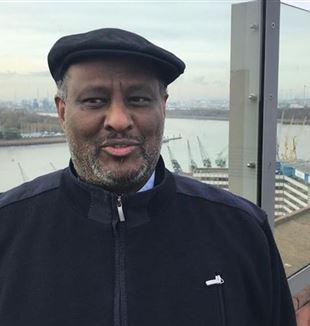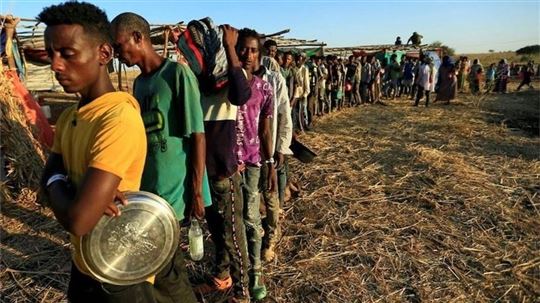
Father Zerai's migrants
He came to Italy from Eritrea at the age of 16, like so many of his fellow countrymen. The welcome, his vocation and mission, and the adventure of the Habeshia Agency, which serves asylum seekers. He recounts his story in an interview.Since then, life led him to get to know and dedicate himself to the needs of refugees, until he decided to become a "priest for migrants". This is how Father Mussai Zerai, 46 years old, founded the association "Habeshia Agency" in 2006 with the aim of giving voice to asylum seekers, because "the rights of the weakest are not weak rights". The work of his Agency is difficult to quantify; but to give an idea, just for requests for rescue at sea, we are talking about 150 thousand people from 2003 to 2018, in addition to all those assisted in Libya, Sudan, Egypt, Djibouti, Saudi Arabia, Indonesia, Cambodia, Yemen, and then Vietnam, Cuba, Uganda, Georgia... The list is very long and the forms of aid are diverse, from scholarships in Ethiopia to assistance in prisons in Egypt.
Fr. Zerai, where does your story begin?
I was born in Eritrea while Colonel Mengistu's communist military regime was in power. One of my earliest memories are the bullet marks on the walls of Asmara, my city. The only spaces of freedom were the house, where I lived with my grandmother because my parents had to leave the country, and the parish of the Capuchin friars. I remember the church dedicated to Saint Anthony, where I was baptized. It was there that I would go to pray and ask: "Let me be useful to myself and to others." I can say today that that question has been answered.
In what way?
When I was fourteen I wanted to enter the minor seminary, but my father did not give me permission, telling me that I could choose it once I was of age. It was providential: I might have become a priest, but I would not be what I am today. In fact, when I was sixteen I came to Italy to reunite with him, with a regular visa and little knowledge of the language: I was a "privileged" migrant. However, my father had to move to Nigeria shortly before my arrival. Thus, when I arrived at Fiumicino, I found myself alone. I had only one point of reference in Rome: the Cistercian abbot of the Casamari monastery, whom I had met on the journey from Asmara to Addis Ababa. And I called him.
What happened in Italy? And how did your commitment to refugees begin?
During the first few months in Rome, I met Fr. Peter Jamesbond, a Sacramentine priest who assisted refugees and helped me get my identification documents. Since I spoke a little Italian, English, Trigrinya and Amharic, he asked me to help him with translations. This was the origin of my commitment: in the morning I worked as a greengrocer, in the afternoon I helped Fr. Peter. As I became involved in assisting migrants in this way, after some time the question about my vocation that I had put aside for over ten years resurfaced. One day an Ethiopian girl, who attended the listening center for migrants that I had helped to create in the chaplaincy of my community, said to me: "You are very attentive to our needs, but we do not only have material needs, we also have spiritual needs. Since you spend so much time with us, why do you not dedicate your whole life to God and your brothers and sisters? Why do you not take this step?" Her words were the bell that resonated within me the question about vocation. Two years later, I entered the seminary, in the Scalabrinian Missionaries, dedicated to the care of refugees: I wanted to be a priest for migrants. Then, to remain tied to the tradition of my Eastern Rite Church, I finished my studies at the Pontifical Ethiopian College in the Vatican. I became a priest in 2010, and four years later I was elected European Coordinator for Chaplains and the contact person for the Eritrean faithful throughout Europe, a task I still carry out today.
How was Habeshia Agency born?
In the seminary, I continued to take care of refugees who arrived in Rome and often did not find assistance. I would introduce myself to institutions to give voice to their needs, but I was constantly asked, "Who are you? Who do you represent?" So in 2006 I decided to found Habeshia, which means "mestizos." It is the name the Arabs gave to the people of the Horn of Africa and it is the same name we use to identify ourselves. At that time, a journalist friend of mine was on a trip to North Africa and, while visiting some detention centers in Libya, he called me to help him understand what the prisoners were telling him. I touched the suffering of those people with my own hands. In 2009, the stories of some refugees oriented Habeshia's work towards another situation: that of the Sinai desert, where those fleeing on foot from Libya were captured by Bedouins. I found out about the dramatic events and received phone calls from those who had been taken, and who begged me to pay the ransom. Because of this commitment and because of how much suffering I was experiencing, I had to interrupt my studies for a year.
Faced with a problem of enormous dimensions, what does it mean to take care of the person, in their uniqueness, their precise need?
If you do not help the individual, you do not help the masses either. And you help with what you are able to do. I remember that when I was a theology student, I was very busy with refugees and I sometimes did not attend community meetings and prayers. My rector sent for me and said, "I see that you are getting busy, however, remember: you are not the savior of the world. The Savior of the world is Jesus Christ. Do all that you are able to do. Leave the rest to Him." I constantly remind myself of this: every time I am unable to solve a problem, I say to the Lord: "I have done my part, now it is your turn. And this saves me from many frustrations, from risks even on a psychological level, because bearing all this pain, these horrible situations, would be humanly impossible without faith, prayer and these reminders that help me not to put myself at the center.
How has your experience as a migrant affected your mission?
I started from the experience I had when I was the caregiver. During my first months in Rome, when I was a guest of the Jesuits at the Centro Astalli, two young men doing civil service asked me one day how long it had been since I had called home. It had been more than a month since I had any money to call. The next morning, they took me to breakfast and bought me two 10,000 lire phone cards. That gesture was important to me, it answered the need I had in that moment.
As you then did with others...
There are so many people I have helped when they were at sea or in Sinai and who I have then met around Europe and beyond. I remember a girl who was paralyzed from the back down during a clash in Libya. She could have come regularly to Europe, through a process of family reunification, because her father and sister were living in Sweden and, given her situation, I had applied for a humanitarian visa for her. Unfortunately, due to bureaucratic problems this was not possible, so she was loaded on a barge. When I found out, I contacted the authorities and they managed to bring her to safety. Today she lives in Sweden, she is married and has a family.
Faced with such dramatic situations, how is it possible not to lose hope?
Hope is the last thing to die. I have often seen situations that seem unsolvable, but at a certain point something opens up. We must hope, we must keep knocking, like the woman in the Gospel who, wanting justice, continues to harass the judge who, in the end, decides to act in order to get rid of her. We must do the same: continue to knock on all doors. There are moments of anger, but we must remember that we men are to blame. To the many people who ask me why God allows certain things to happen, I answer that He is not a puppet master, otherwise He would fail in what He is, in what He has promised: He has given us conscience and freedom. It is the consequences of our choices that generate what is happening. We must take full responsibility for our freedom, we must continue to hope and to sow good. We must all understand that the rights of the weakest are not weak rights. This is a serious error that often passes as correct interpretation: people think that the right is either a privilege or a handout. The right must only be recognized and must belong to everyone, it cannot be a privilege just for some.
On his recent trip to Iraq, the Pope spoke of migration as "a double right: the right not to migrate, the right to migrate."
The right "to stay" had already been addressed by John Paul II and Benedict XVI: it means that people are not forced to leave their land because of war, hunger, political or ethnic-religious persecution.... The international community must act on the causes. It must act promptly and, if possible, prevent. This is lacking, it is not doing its duty.
Does your association also take care of those who "stay"?
We are very small, but we raise awareness campaigns, both with the European Union and the United Nations. Right now we are following the conflict in Northern Ethiopia, which is driving thousands of people to flee. There are about eight million inhabitants in Tigray. This means that there will be thousands of refugees, if not millions. We are insisting for international institutions to intervene to stop this conflict and to open a commission of inquiry on the crimes committed so far. Those responsible must not go unpunished.
What can each of us do about these emergencies?
There are two things that can be done. Raise public awareness. TV and newspapers do not talk about these facts. Italy has a historical responsibility towards these countries and instead there is a strong lack of interest. And then, the sensitization on aid. The Italian Bishops' Conference has allocated 500,000 Euros to help Tigray. But there is a need for other organizations and even individuals to support the local Church that is asking for help to sustain the population.